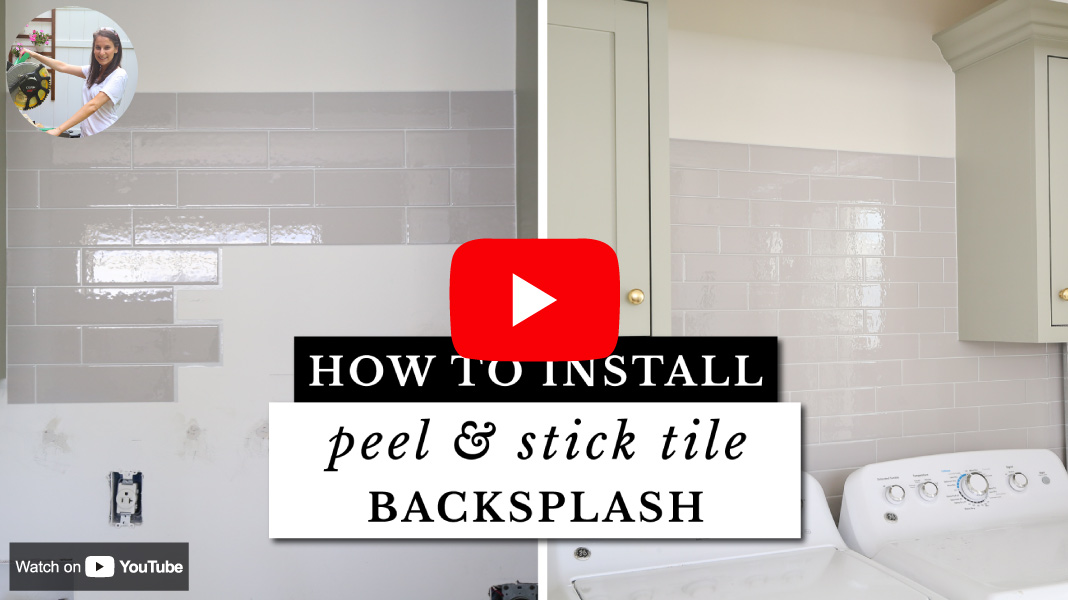Learn how to install peel and stick backsplash tile on a wall, the pros and cons, and my best tips for installing peel and stick tile backsplash!
For our laundry room makeover, I loved the idea of adding backsplash tiles to the wall between our DIY cabinets. However, I didn’t want to take the time to install real tile since it is labor intensive and I wanted to keep this makeover on the easier side!
It was the perfect opportunity to try peel and stick tile for the first time, something I’ve been wanting to try for a while!
Here is the final result of our peel and stick tile backsplash! Love!
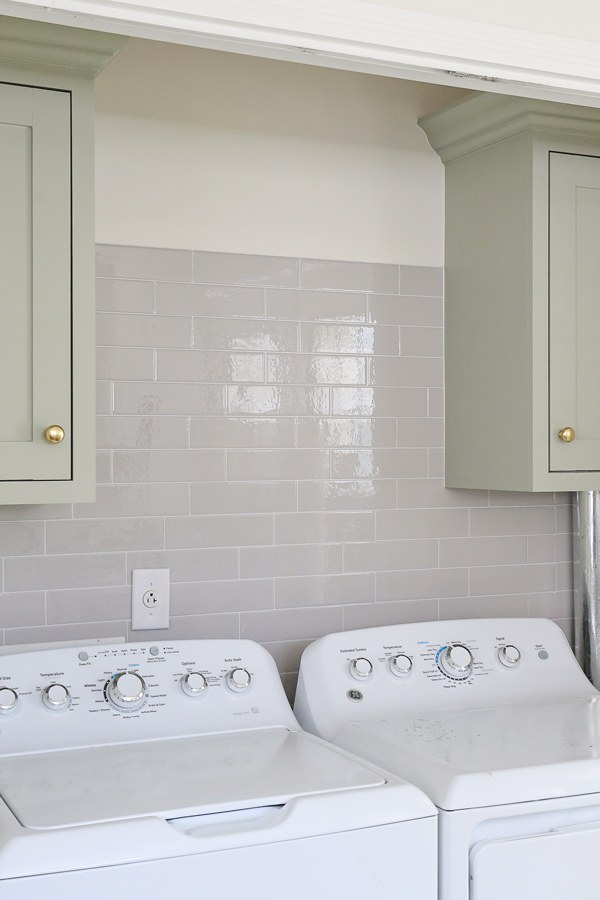
Pros and Cons of Peel and Stick Tile Compared to a Real Tile Backsplash
We’ve tackled 3 real tiling projects in our home, including our subway ceramic tiles backsplash for our DIY kitchen makeover. So, it was interesting to compare the process of installing regular tile to peel and stick tile backsplash.
Pros:
- Less labor intensive and less time to install compared to real tile, it’s an easy DIY project!
- No special, expensive tools needed for installing (no wet saw needed)
- Renter friendly, can easily be removed
- Easy to change if you get tired of it
- Can be less expensive than real tile if you were to hire out the installation of the real tile and depending on peel and stick tile used
- Great idea for an accent wall or easy makeover on a wall
Cons:
- Still takes time and patience to install yourself
- Can appear faux and not as good looking as real tile
- Not as durable as real tile
- If poor quality tiles are used, they can yellow over time and not stick well
- Can be pricey compared to real tile if you were to install the real tile yourself and depending on product used
Note, this post contains some affiliate links. I may earn a commission if you shop those links (at no cost to you). Thank you for supporting my small business. For more info see my disclosures here.
Peel and Stick Backsplash Options and Cost
If you can order samples of the peel and stick tile options you are considering, I definitely recommend doing this, it’s a good idea before ordering all of your material!
With this being my first peel and stick tile project, I ordered samples of three different options: white subway peel and stick mosaic tile, marble subway peel and stick tile, and grey mosaic tiles.
The white subway peel and stick tile was the cheapest but once I received the sample it was already yellowing and was poor quality, despite the many high quality reviews.
The marble and grey samples were both the same Smart Tiles brand and more expensive, but the quality was really good and the best option to go with.
I decided the cost was worth the high quality to do the project right and not have peeling tiles off the wall in the future.
I went with this grey mosaic peel and stick tile because I loved the look and it was less expensive than the marble. I ended up using about 20 square feet, for a total cost of $115.
If I had used real, ceramic, gray, subway tile, the tile itself would have been cheaper per square foot than the peel and stick tile. But, if you include the cost of mortar, grout, and installation, real tiling is more expensive than using adhesive tiles. Just some factors to consider!
Ok let’s get’s get started with how to install peel and stick tile backsplash!
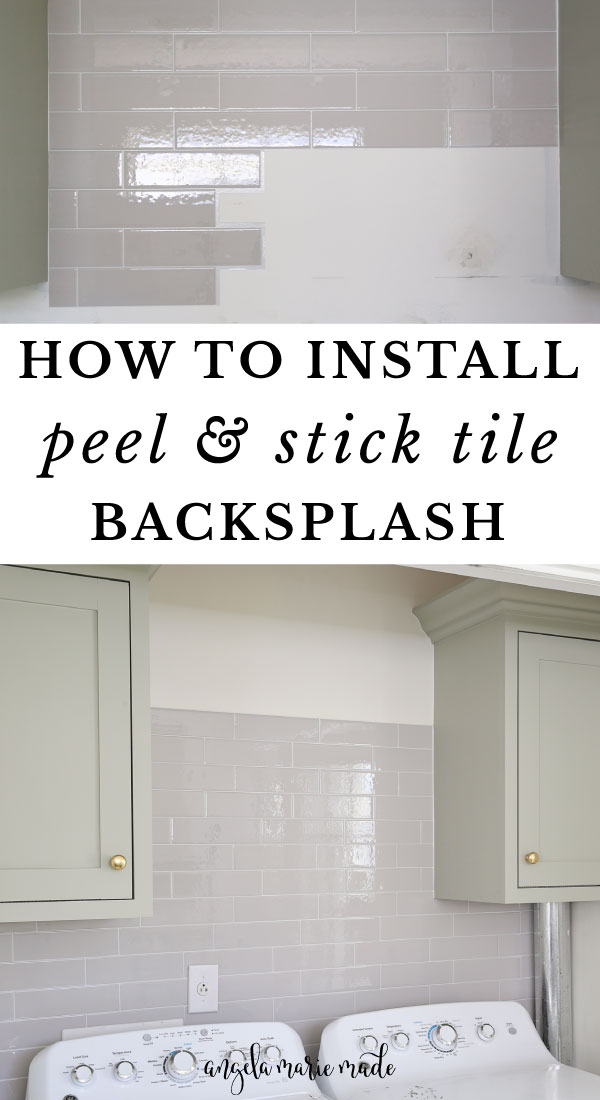
How to Install Peel and Stick Tile on a Wall:
Tip: Make sure to order extra material for any mistakes!
Materials
- Peel and stick backsplash tiles (we used these gray mosaic tiles)
- Cutting Mat
- Painter’s tape
- Metal ruler
- Pencil
- Degreaser (I used this cleaner)
Tools
- Utility cutter
- Measuring tape
- Level
How to Install Peel and Stick Backsplash Video
Subscribe to my YouTube Channel here!
1. Prepare the wall for the peel and stick tile
I prepped the wall based on the instructions for my tile.
Make sure the wall is smooth and it has not been painted in the past 21 days before starting.
Remove any wall outlet cover(s) or other removable covers.
The entire wall surface must be cleaned with a degreaser. TSP can be used, but I used Krud Kutter, which is another brand of degreaser that works well.
For the Krud Kutter, I followed the instructions on the bottle and mixed it with water and then wiped the wall down with it using a sponge, followed by a clean rag. Make sure to let the wall fully dry.
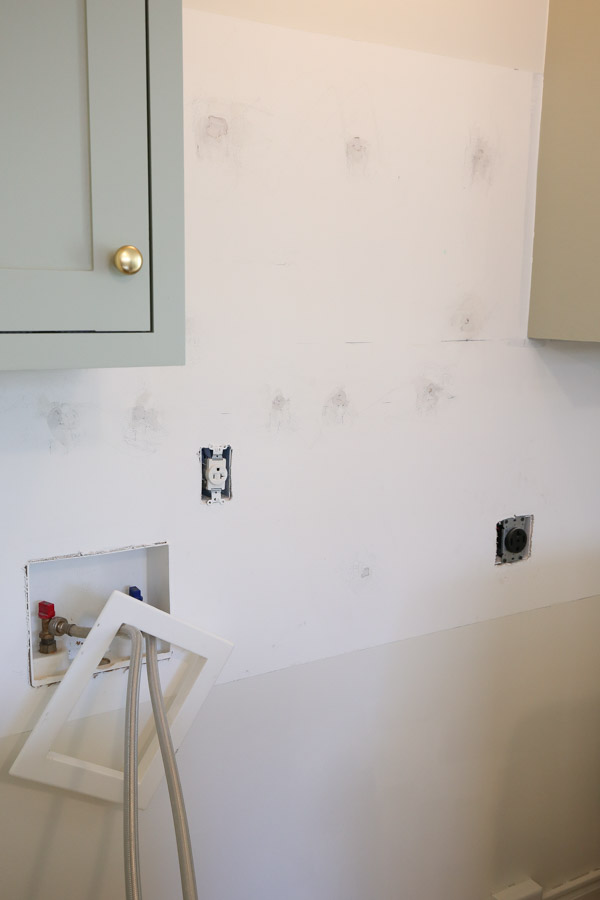
This prep step is similar to any peel and stick project, including DIY peel and stick wallpaper too!
2. Draw a level line for the top tile edge
Determine where you want the edge of your tile to be and draw a level, straight line for the top tile edge. If tiling under cabinets, make sure the bottom of them are level as you want to start with a level edge.
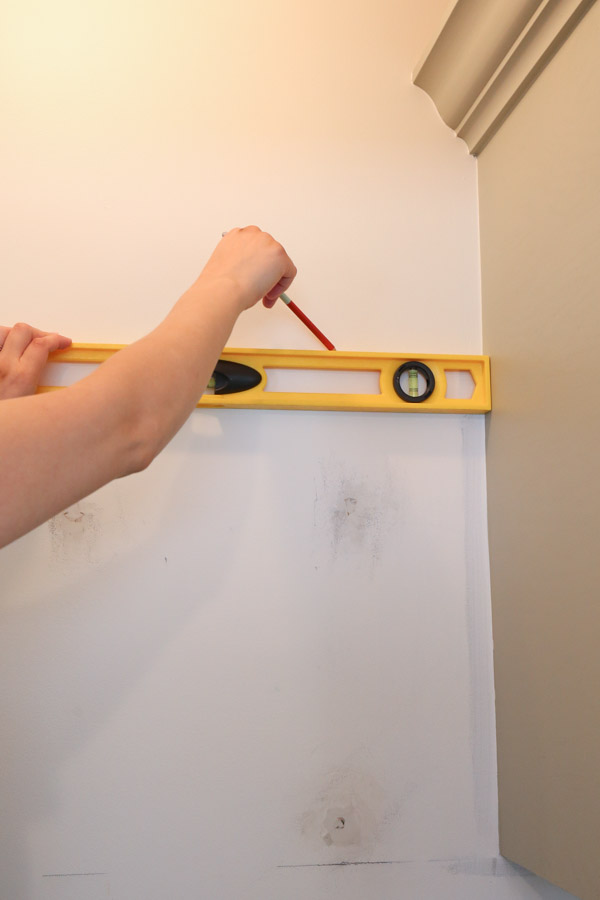
3. Cut a straight edge off the first tile sheet
How to cut peel and stick tile
Begin by cutting a straight edge off of a full tile sheet with a utility cutter. Mark with a pencil where you are going to cut the straight edge.
Use the lines on the cutting mat to line your tile sheet and ruler up for a straight cut. And use painter’s tape to help hold the tile in place while lining the ruler up and cutting.
It may take a few passes with the utility knife to fully cut through the tile sheet.
Save the cut part of the tile sheet for later if needed.
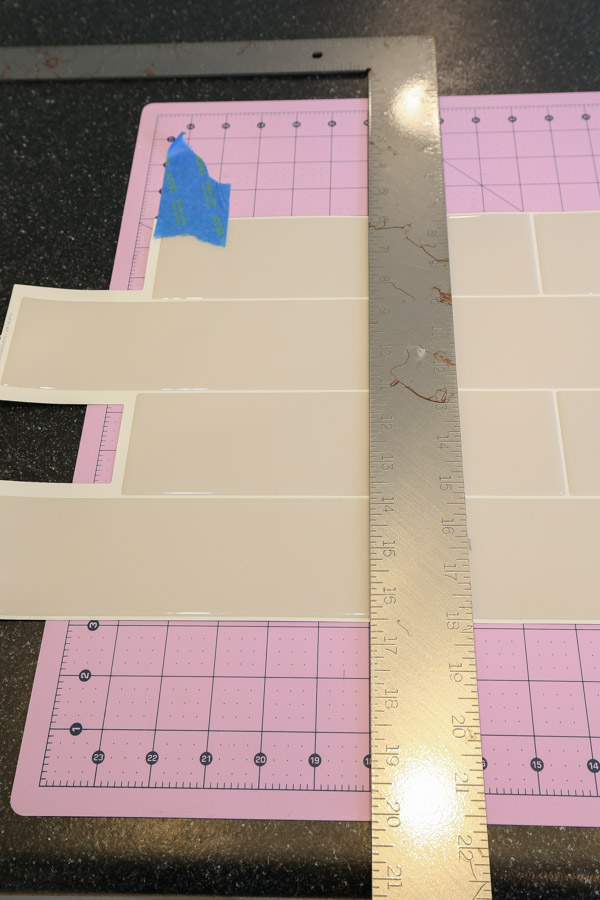
Note, you can see all of this cutting in action in the DIY peel and stick backsplash tile VIDEO!
4. Install the first tile
Before installing the cut tile sheet, it helps to peel back the white backing paper some from the back of the tile. Try not to touch the adhesive backing though.
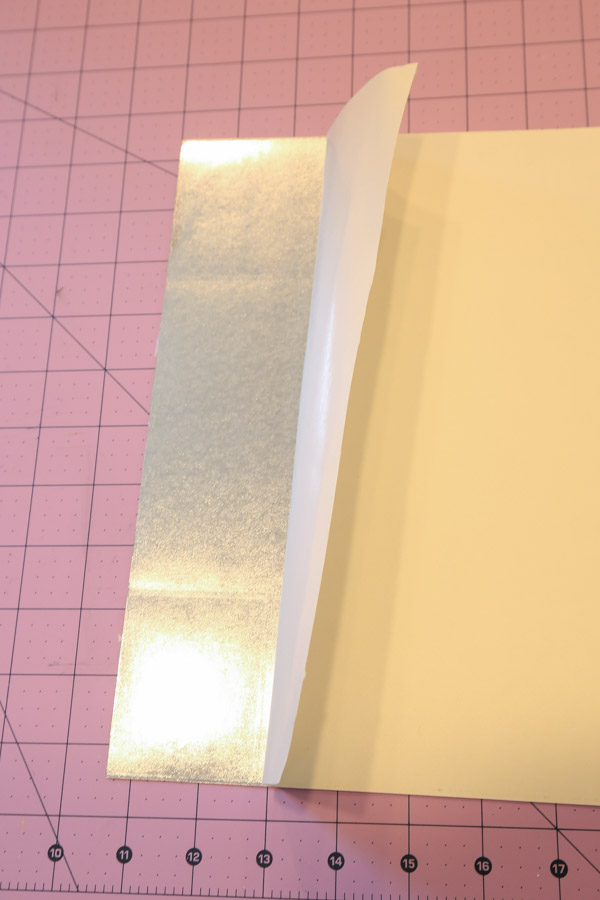
Line up the top of the tile sheet with the level line and carefully pull back the white backing paper, while pressing down the tile sheet along the level line.
Smooth the tile down with your hand and make sure no air bubbles remain.
The tile can be pulled off the wall some to for adjustments if needed.
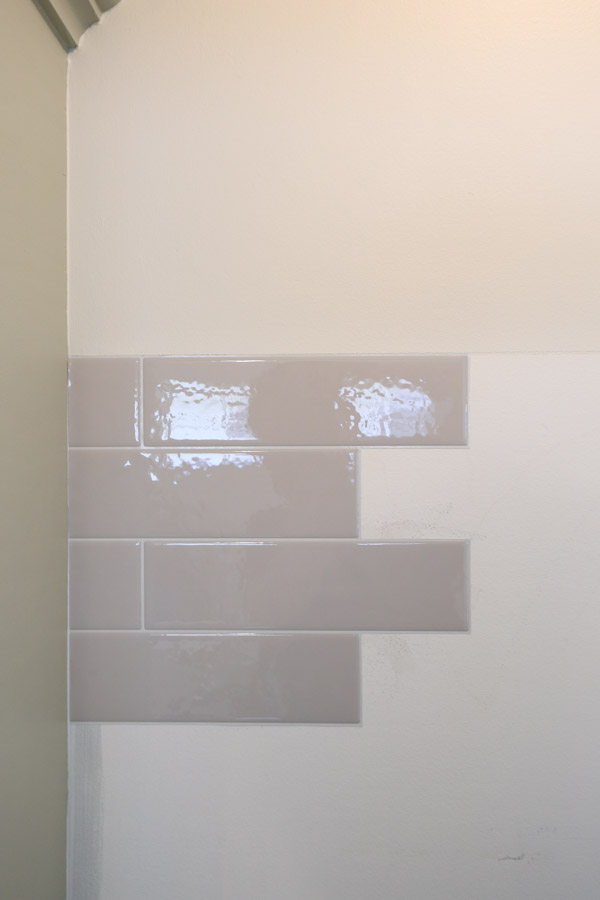
Also, this tile can be caulked, so if you have a small gap along the side edge, like we do here along our cabinet edge, it’s ok because it will be caulked at the end! I was more concerned about my tile being installed level.
5. Install the second tile sheet
The second tile sheet will most likely be the first full tile sheet for installation.
If your tile sheets are large like mine, which are 23″ wide, they can be more difficult to install between removing the backing paper, keeping the tile level and lining up the grout lines on the first tile.
But I have a trick that makes it easy and works great that I use for my wood sign stencils and vinyl decal applications!
Peel back the white backing paper just a little to get it started but don’t crease it or remove any of it.
Add two pieces of painter’s tape to the tile sheet then line the tile sheet up exactly on the wall where it needs to be installed. Make sure it is level with the level line along the top and the left grout edges overlap the grout edges of the previous tile installed.
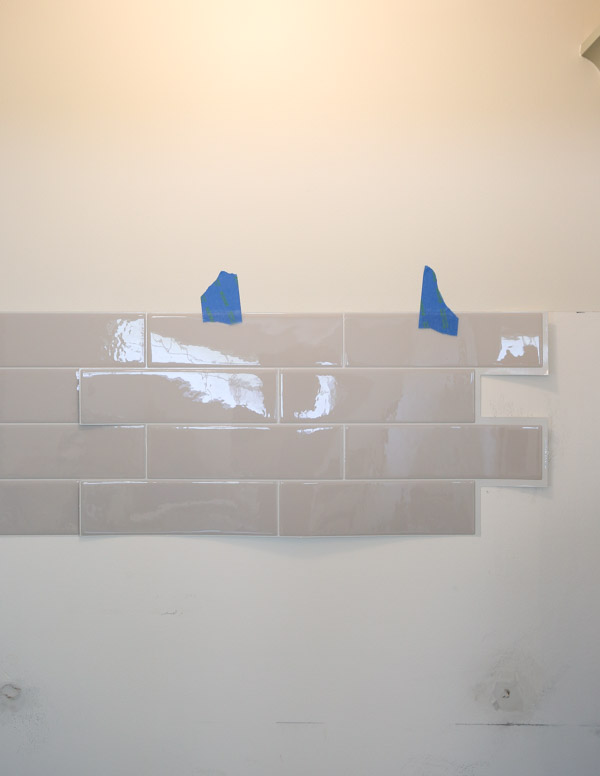
Once in place, press the painter’s tape down on the wall to hold the tile in place. Double check again everything is lined up perfectly.
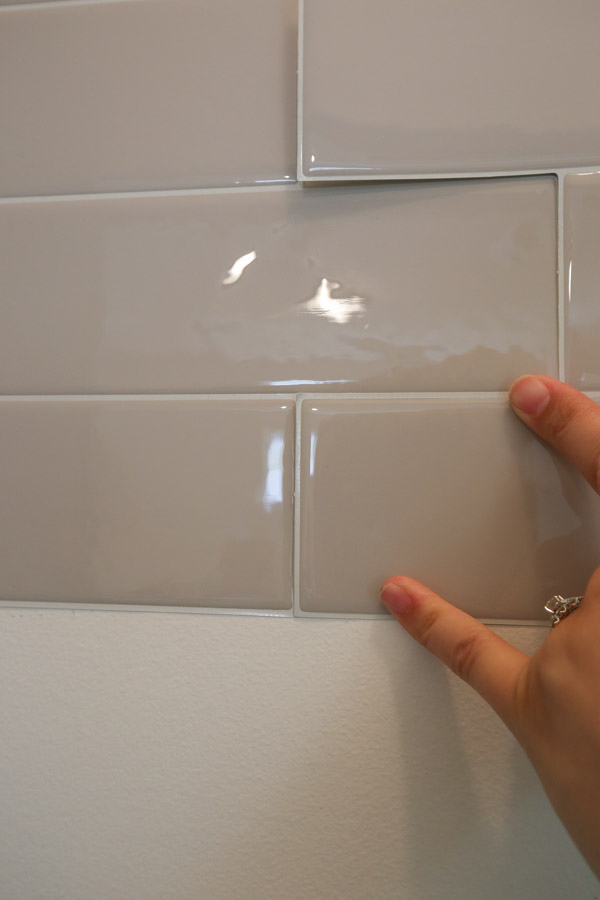
Next, peel back a few inches of the white backing paper from the left side of the tile and cut it off with scissors to remove it.
Then, press the cut, sticky side down against the wall and smooth it out.
Slowly and carefully remove the rest of the white backing paper pulling from the right side of the tile, while smoothing down the tile from the left at the same time.
Remove the painter’s tape and your tile should be installed exactly how you lined up initially!
Note, you can see all of this in action in the how to install peel and stick backsplash VIDEO!
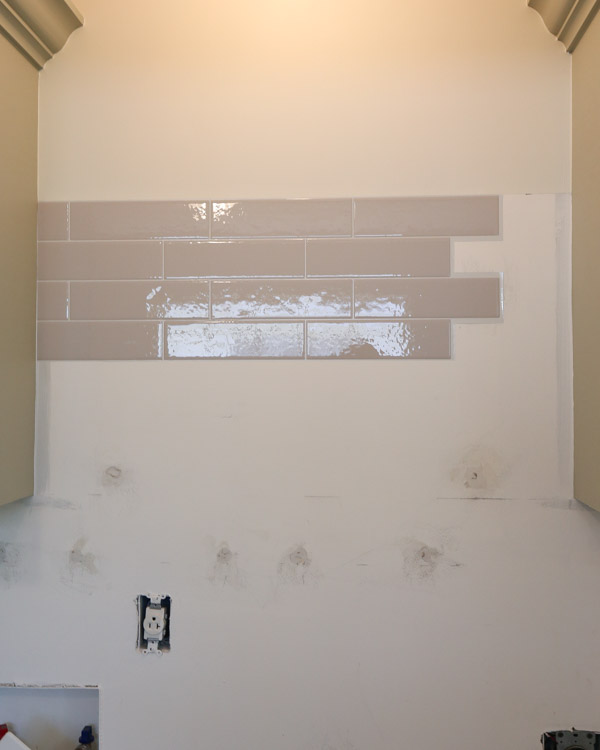
We used this install trick on all of our full tile sheets. Note, I have also used this same method for installing peel and stick wallpaper too!
Continue installing the tile until you reach the end of the wall.
6. Measure and cut tile for the end of the wall
Once you hit the end of the wall, measure the remaining wall space from the wall edge to the tile edge, not the white grout lines.
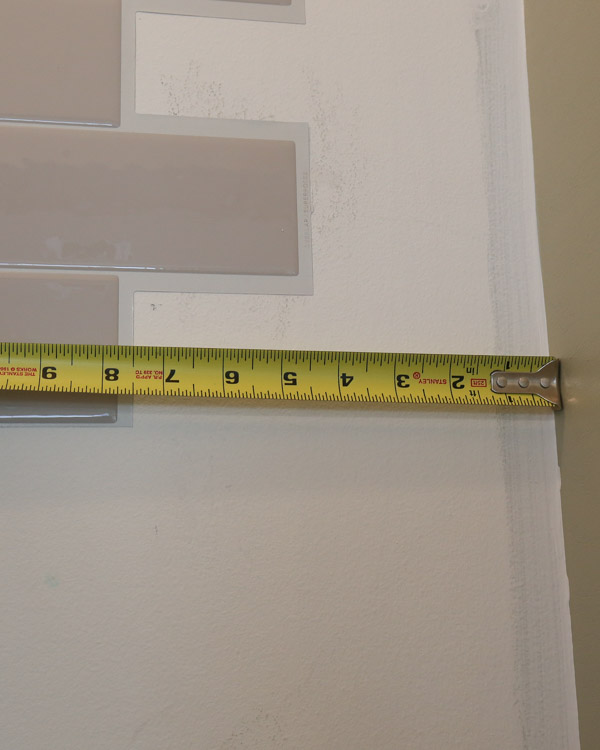
Mark this measurement on a new tile sheet. Make sure to measure from the white grout line edge on the new tile sheet, since that will line up with the tile edge on the wall!
Cut the tile to size at this mark using a utility knife and ensuring the cut is straight again.
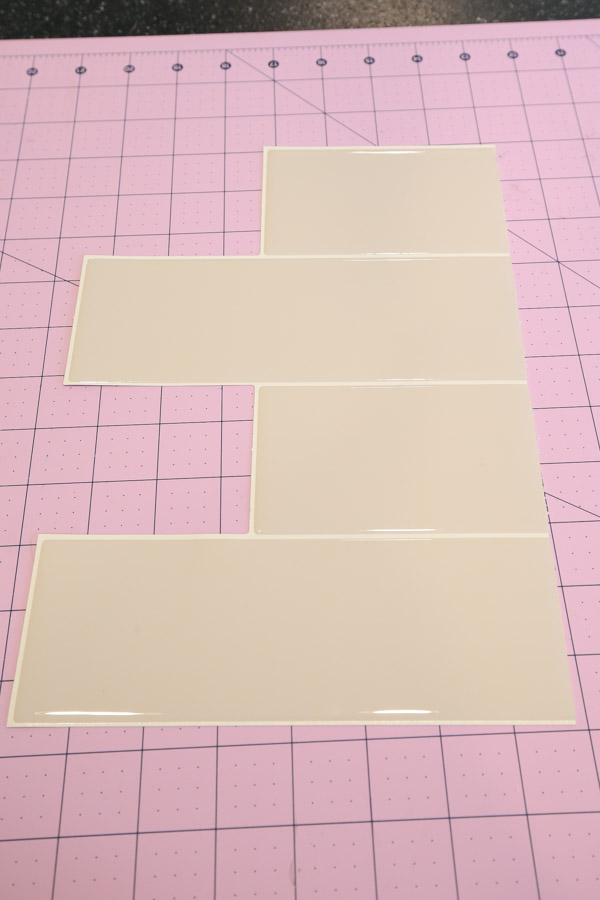
For these smaller cut tile pieces, I just fully removed the white backing paper before installing on the wall since they were easier to work with being smaller.
Apply the edge piece to the wall. Again I wasn’t concerned about a perfect side edge cut against our cabinet because we are caulking, I just wanted to the tile to be perfectly level with the top level line.
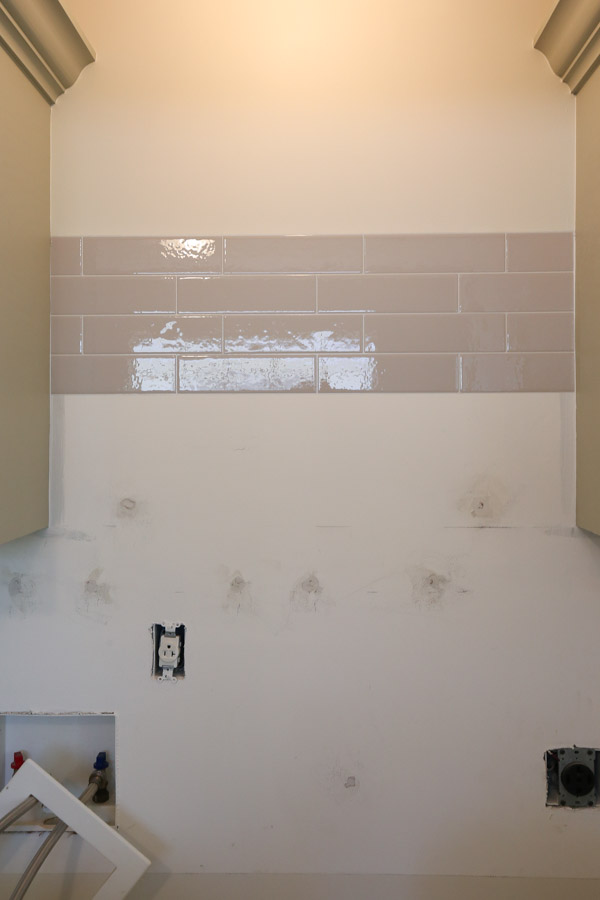
7. Install the peel and stick tile on the next row
Once the first row of tile is installed, begin installing the second row of tile.
Use the remaining cut tile sheet from the previous step, with the cut straight edge, to start the next row. Using this cut tile his helps to minimize material waste and it helps save time too!
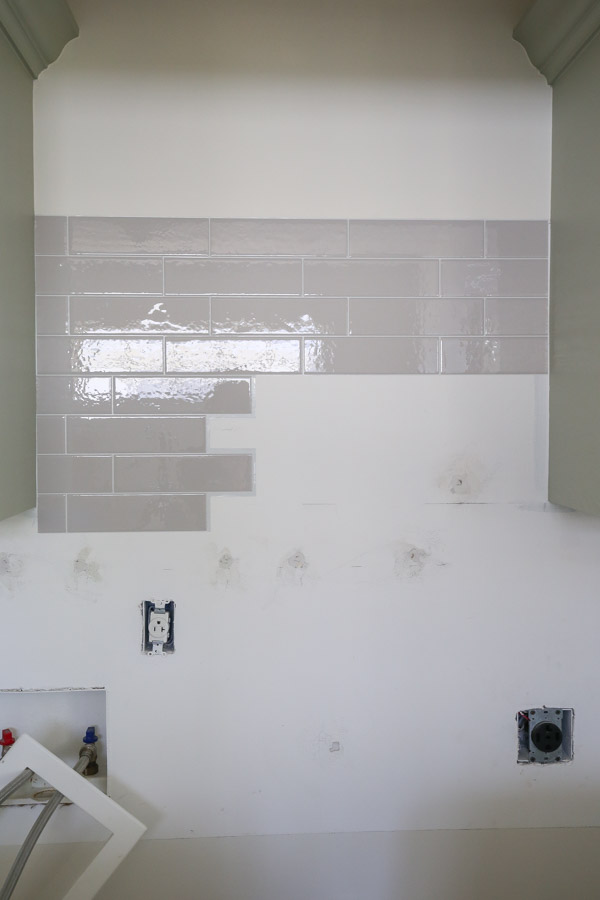
Continuing to install the peel and stick tile using the same method as the first row.
Special Cuts
When you come across an object on your wall that needs a special cut, like the bottom of our wall cabinet, just measure and mark where the tile needs to be cut out on the tile sheet using a pencil.
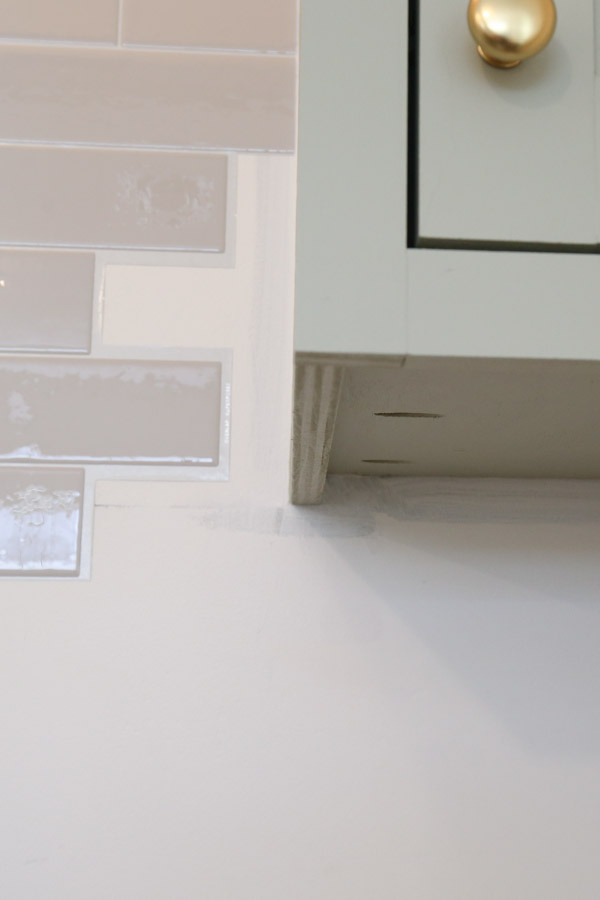
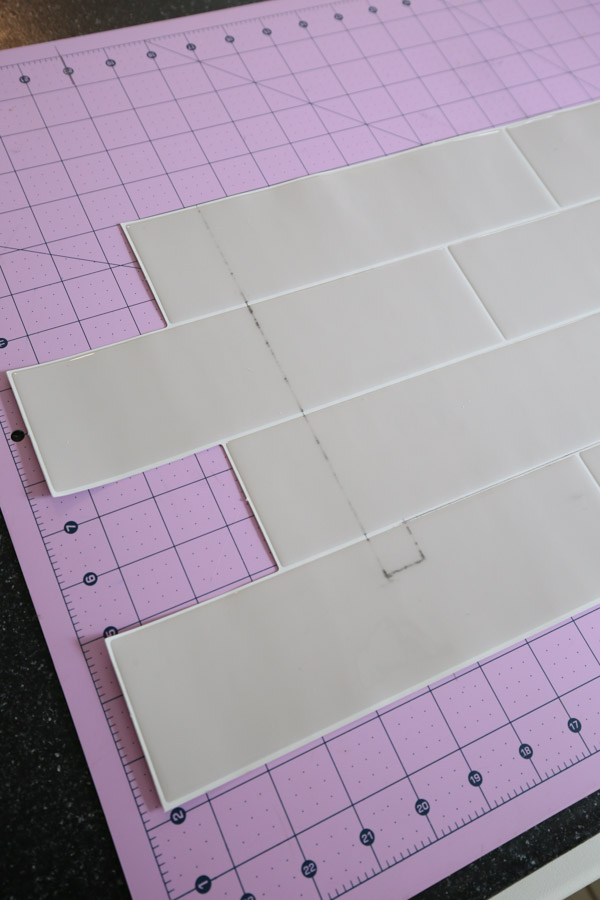
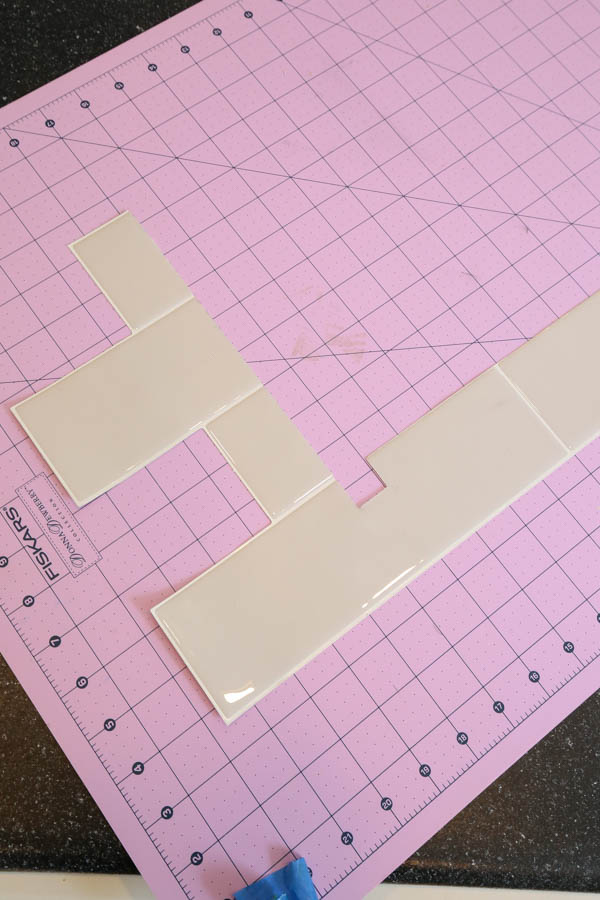
Then, make the special cut and test fit it to make sure it fits well before applying to the wall.
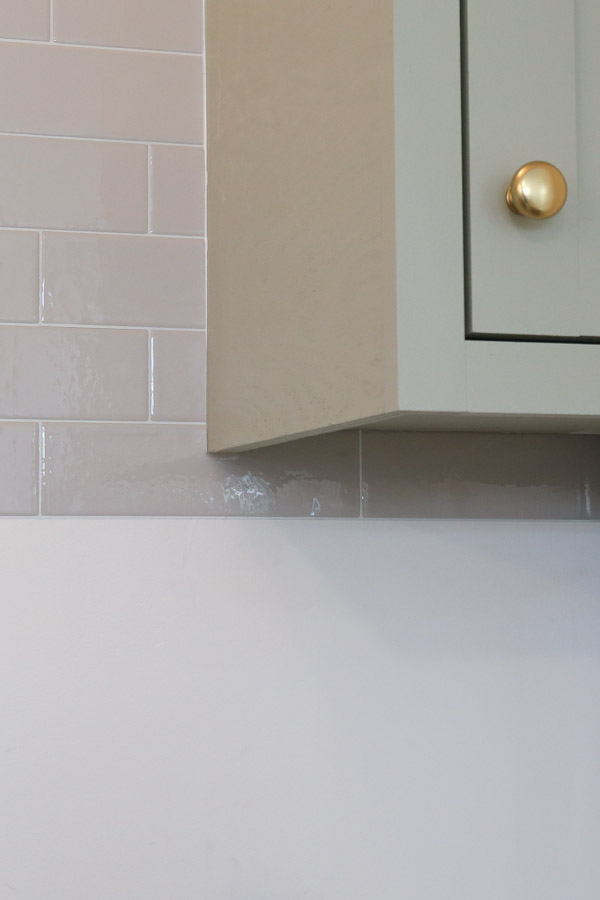
You can also cut out individual tiles too for these special cuts, like we had to do around the bottom of one of our cabinets.
Wall Outlets
For wall outlets or any other wall coverings like our washer box cover, you don’t need to be as precise for cutting around them, if your peel and stick tile is really thin like our tile. Our tile is only about a 1/16″ thick so the wall outlet covers can go over the tile at the end.
For our wall outlets and washer box cover, we just taped the tile sheet in place and marked with a pencil where to cut.
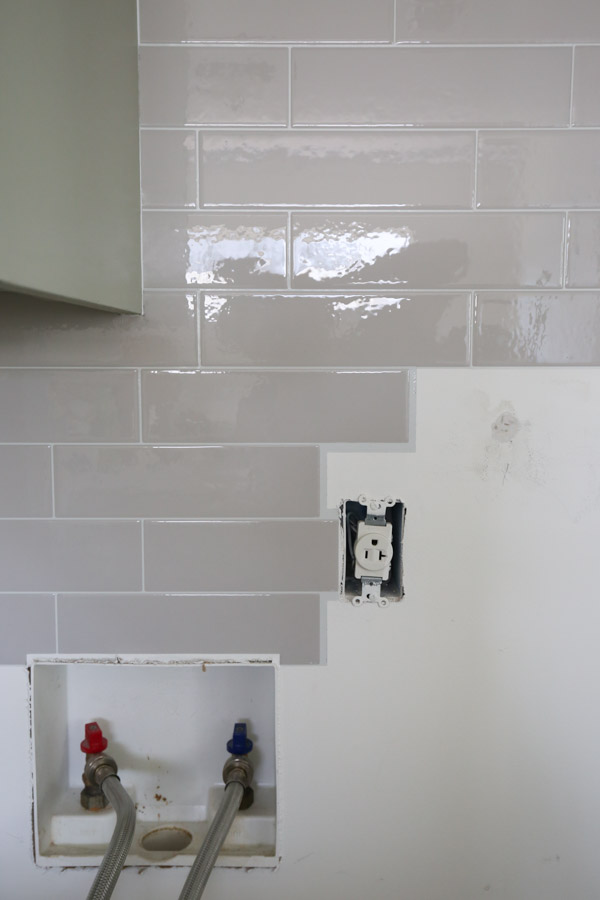
Once the tile installation is complete, install your wall outlet covers and any other coverings back on the wall!
Caulking
If desired, add paintable caulk between the wall edge and vinyl tile edge, let dry, and then complete any needed paint touch ups.
Note, silicone based caulk can be used too if going along a counter edge.
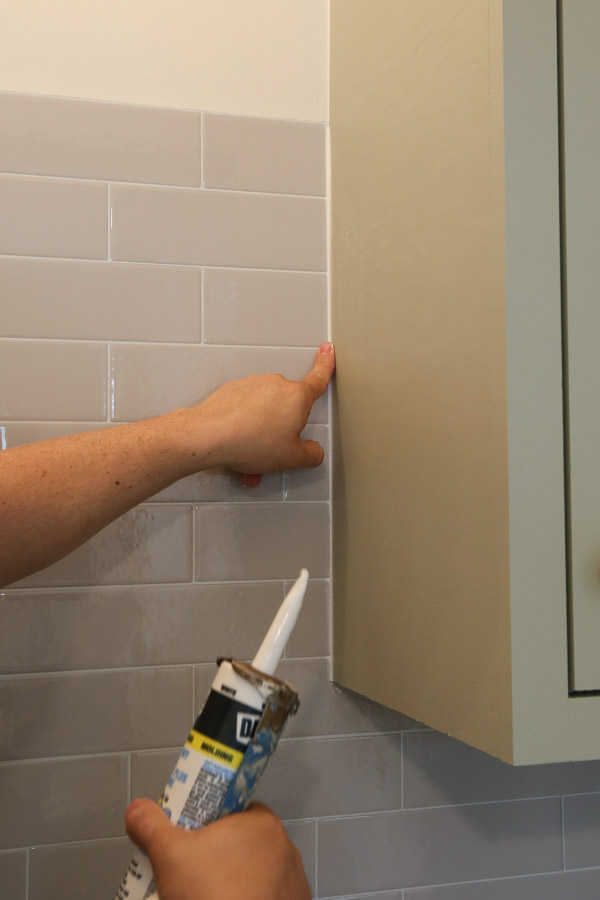
Peel and Stick Backsplash Tile Installation Tips
Tip 1:
When starting a new row of tile, make sure the grout lines of the new row aren’t too closely aligned under the grout lines of the tiles in the row above as shown here. You want a continuous even pattern of the subway tile and this looks funny.
We made this mistake on our last row of tile and decided not to fix it because it will be mostly hidden behind our washer and dryer.
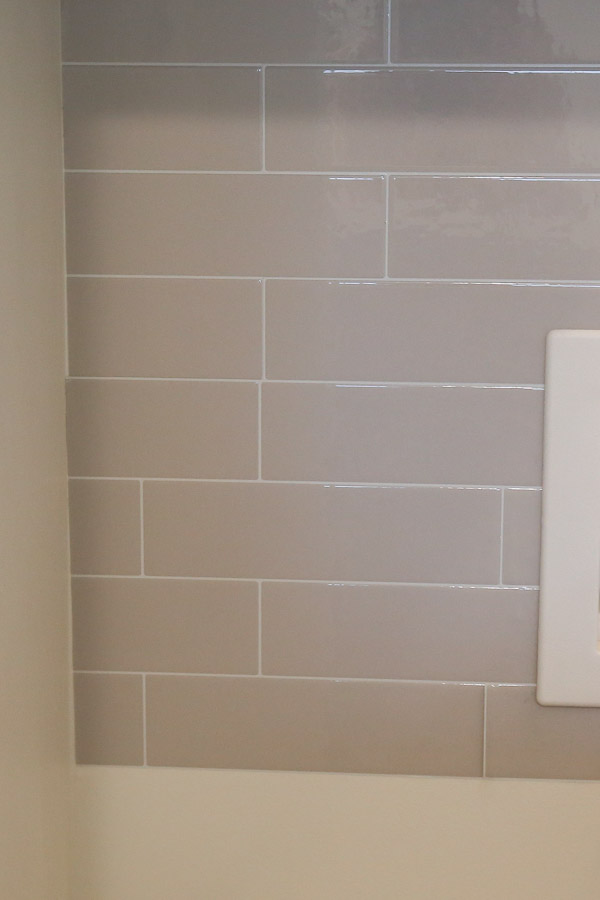
Tip 2:
Make sure to separate tile sheets when you remove them from the packaging. We ended up cutting through two tile sheets by mistake because they were perfectly stuck together.
Tip 3:
As noted above, make sure to order extra tile than what is needed due to installation mistakes and miscalculations of material needed. You can always return what you don’t need!
Tip 4:
Be patient and don’t over analyze every little detail! From far away it’s hard to see little mistakes and it looks great!
How to remove peel and stick tile
Peel and stick tile is meant to be removable. It’s basically like a removable vinyl peel decal. You can also use a hair dryer to warm up the adhesive and make it even easier to remove.
Just make sure that the wall surface you are applying the tile to has not been painted recently. Our tile instructions said at least 21 days.
If you apply any kind of peel and stick tile or adhesive to a paint that is still curing, it can damage the drywall when removed. I’ve made this mistake with Command Hooks!
The Final Result!
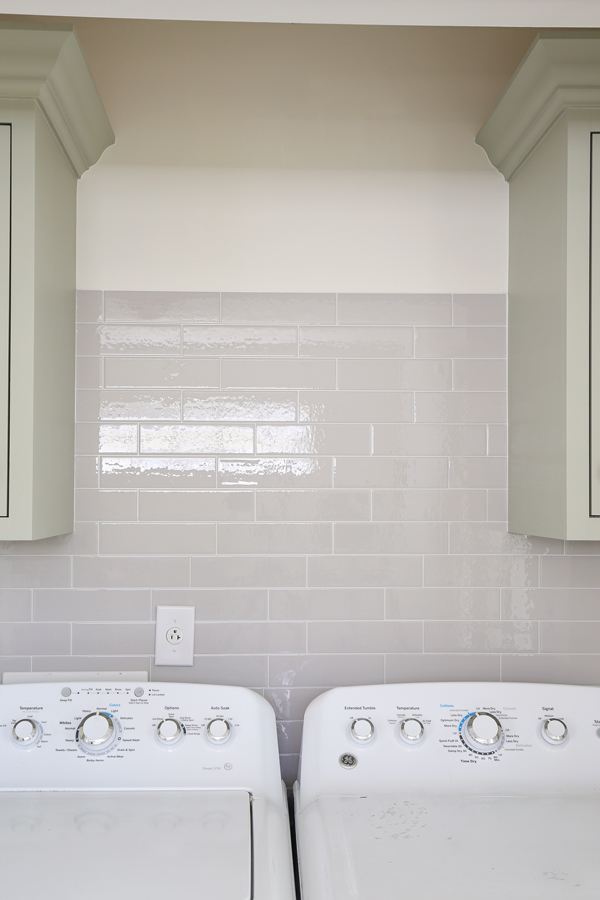
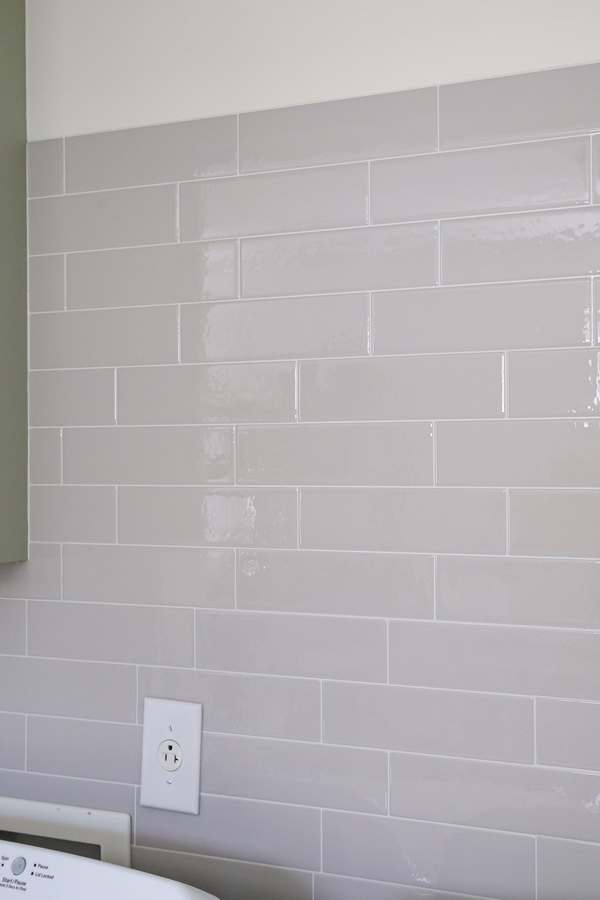
Overall, I love the end result of this peel and stick tile backsplash, it made a huge difference on our laundry room wall. I’m so glad I went with the grey, higher quality tile. It really elevates the look of our laundry room!
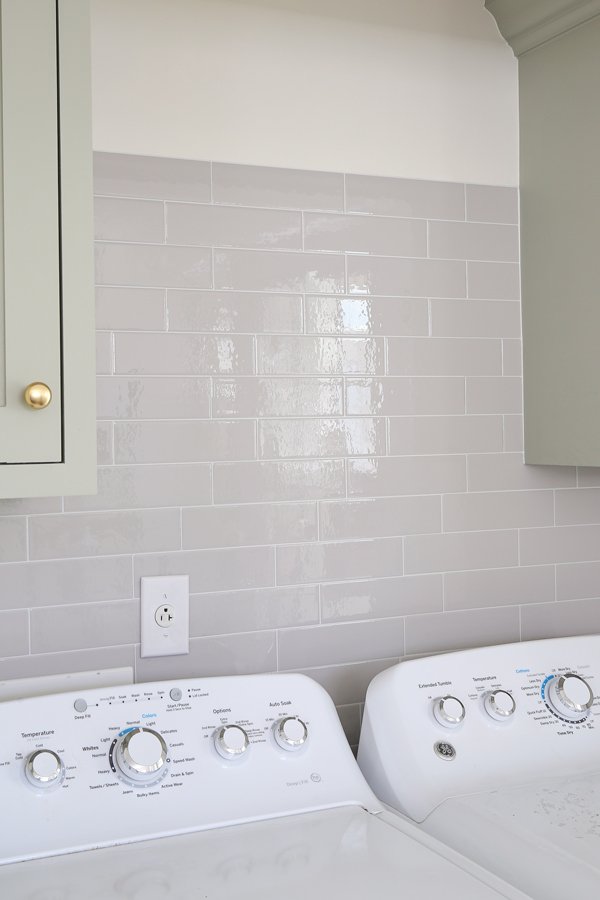
Let me know if you have any questions below on how to install peel and stick tile backsplash!
And make sure to check out how to install peel and stick wallpaper too!
Make sure to follow along on Instagram and on YouTube! I’ll be sharing the full laundry room makeover soon!
